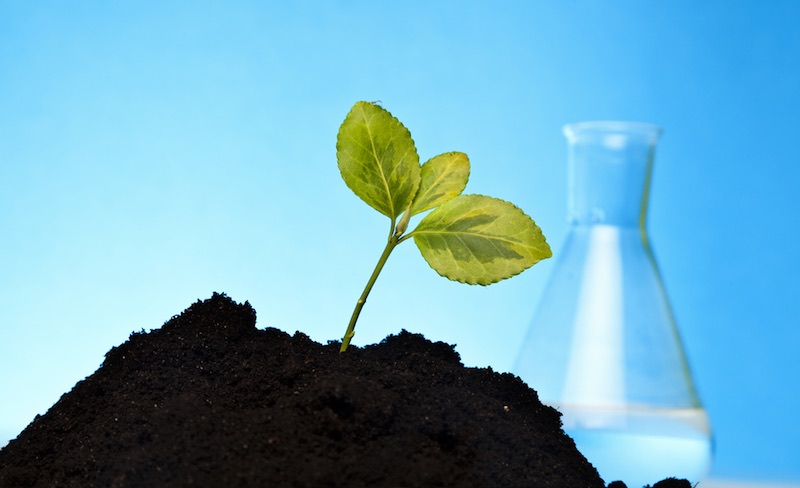Newsletter Signup - Under Article / In Page
"*" indicates required fields
Biology is helping us find more sustainable solutions to the world’s problems. Claus Crone Fuglsang, Senior VP of Research and Technology at Novozymes, gave me an insight into the rapidly moving field of industrial biotech.
Novozymes, the world’s largest producer of industrial enzymes, is one of the oldest players in the field of industrial biotech. “We’ve been around since 1927, close to 100 years now,” said Fuglsang. “Our enzymes go into all sorts of applications across laundry detergents, starch processing, brewing, bread making, textiles, biofuels and more.”
Approximately half of the world market of industrial enzymes is dominated by this Danish giant, which is making a big difference in the journey towards a future where the current fossil fuel economy will be replaced by the ‘bioeconomy’.
“Industrial biotech replaces chemical processes with a biological process that is more sustainable,” explained Fuglsang. “One example is laundry: if we can lower the temperature at which you wash your clothes from 40 to 30 degrees through enzyme technology, that means saving energy equivalent to the consumption of up to two million households per year on a European scale. It’s very significant.”
Biological processes can be incorporated into the production of almost anything, including food, fuel, textiles and other materials. As they replace traditional chemical processes, they take us closer to a future where sustainability doesn’t come with a higher cost.
“There are some fantastic opportunities in the whole value chain, from growing crops to refining the products sitting in the consumer home,” commented Fuglsang. “For example, using less pesticides and fertilizers, increasing yields, or manufacturing products that can be recycled or at least biologically sourced, lowering our dependence on depletable resources in the future.”

With advances in biology that are making research faster and more affordable, a future where biology is present in the production and manufacturing of all sorts of products and services is closer than many realize.
“I definitely see the pace picking up in the research and what it can provide. Improvements in gene editing, automation and advanced screening technologies allow for higher research capacity to find more and better solutions,” noted Fuglsang. He compared it with the digital revolution, where the growth has been exponential since it started in the late 20th century.
“It’s already happening in some places. For example, in the US more than 10% of the gasoline is already a biofuel, and that’s the largest gasoline economy,” he says. “You see biorefineries being established in Europe now, through the Bio-Based Industries program the EU is sponsoring. You also see biosourced chemicals or bioplastics.”
Still, there is a long way to go and many challenges ahead. One of them is introducing biological solutions into well-established markets. “We’re working with vegetable oil processing companies, which are very traditional. Although we can do fast innovation, the pace at which you introduce it in the industries can be slower.”
“Too often we pay lip service to all the good we want to do, but when it comes to a consumer willing to pay for these products we still need to be post-competitive on the materials we offer.”

A challenge unique to Europe is that lack of a unified market. Although it is better off than the US in terms of its carbon footprint, Fuglsang believes industrial biotech in Europe could benefit from taking a bolder approach. “I think Europeans tend to look for the perfect solution. Sometimes you need to make smaller but certain improvements on the way to perfection rather than fulfilling all purposes from scratch.”
Moving forward, in the last decade Novozymes has ventured into using whole microbes, especially in agriculture applications. The spores of a bacterium called Penicillium bilaiae are used to coat seeds and help the plants increase the uptake of nutrients from the soil, reducing the need for fertilizers and increasing the yield.
“You get better use of the same amount of land, getting 2-3% higher yield when using these bio inoculants together with the seeds,” Fuglsang pointed out.
Whole microbes are also promising in animal farming, a field that Novozymes recently entered with the launch of a product to improve the nutritional value of the feed given to chickens in farms.
As industrial biotech develops more and better products, the world is also starting to shift towards seeking more sustainable solutions. “It’s something that is getting higher in the agenda of politicians and governments around the world. You see it in the UN sustainability goals, including access to clean drinking water, reducing pollution, developing an efficient agriculture and forestry system… Consumers around the world are taking conscious choices about what they want and what they will accept being used in the supply chain.”
With the public on board and the technology to keep pushing forward the possibilities offered by biological research, a future dominated by the bioeconomy, where biotechnology is everywhere from our food to our clothes, might not be that far away.
Images via Shutterstock






